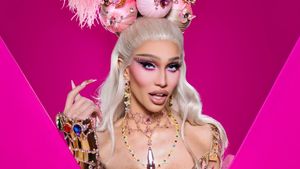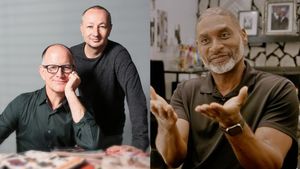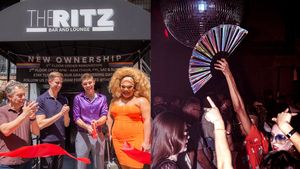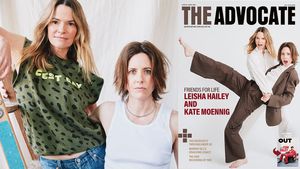Tonight's prime-time Republican presidential debate on CNBC, like the earlier debate between lower-polling candidates, focused on economics with little attention to social issues -- but the latter did arise, especially with Ben Carson.
Carson, the retired neurosurgeon who's recently overtaken Donald Trump in some polls, was asked about his service on the board of Costco, rated one of the most gay-friendly companies in the nation, and how that squares with his views, which are antigay by most measures. He responded that it's possible to be "perfectly fair to the gay community" while believing that marriage should be limited to opposite-sex couples.
He dodged a question, though, about price increases by drug companies, most likely a reference to the proposed 4,000 percent rise in the price of Daraprim, a drug used to treat toxoplasmosis, an infection that can be particularly severe in people with HIV. He deflected the query by saying government regulations are the biggest culprit in rising drug costs. New Jersey Gov. Chris Christie then jumped in and said, "We don't need Hillary Clinton price controls."
Clinton and President Obama came in for much criticism from the 11 candidates in the mainstage debate, with participants claiming "big government" solutions to problems just create more, and that the nation needs less government and lower taxes. They fought over who has the best tax plan and also excoriated the mainstream media for supposedly favoring the Democrats.
In the first Democratic debate, the candidates got "fawning questions" from the media, said U.S. Sen. Ted Cruz of Texas, who objected to the tone of questions in tonight's debate. "This is not a cage match," he said.
One of the questions that raised his ire was moderator John Harwood's opener to Trump, citing his lofty promises about cutting taxes without adding to the deficit and building a wall to keep out undocumented immigrants. "Is this a comic book version of a presidential campaign?" asked Harwood, to which Trump replied that it wasn't a nice way to ask a question.
Ohio Gov. John Kasich, though, questioned some of the tax schemes put out by Trump and others, saying they are "fantasies." Kasich, as a governor and former U.S. senator, said he actually has experience with balancing government budgets.
U.S. Sen. Marco Rubio of Florida also took a swing at the media, saying in a discussion of super PACs, which can do unlimited spending on behalf of candidates, "Democrats have the ultimate super PAC, and it's called the mainstream media." He said that last week's congressional inquiry of Clinton about the terrorist attacks in Benghazi, Libya, while she was secretary of state, showed her to be a liar, while the media characterized her performance as a triumph.
Former Hewlett-Packard CEO Carly Fiorina said the economic policies espoused by Clinton and Obama hurt the middle class and especially women, and that she was a better choice than Clinton to be the nation's first woman president. "I may not be your dream candidate just yet, but I assure you I'm Hillary Clinton's worst nightmare," she said. Former Arkansas Gov. Mike Huckabee, meanwhile, talked about his years fighting the "Clinton machine."
Huckabee objected to a question about whether Trump has the moral credentials to lead the nation, saying he didn't want to give Trump extra time, but he said the business tycoon would make a much better president than Clinton.
Trump, as usual, touted his record in business too, although the questioners caught him in a lie about his criticism of Facebook head Mark Zuckerberg, who has endorsed increasing the number of a certain kind of visa that allows workers with technological expertise to come to the U.S. He denied that he criticized Zuckerberg, but some research found that the criticism was on his own website.
The candidates also sparred about the best ways to assure the continued existence of Medicare and Social Security, with Carson and former Florida Gov. Jeb Bush endorsing private savings accounts as an optional alternative to Medicare, and some candidates suggesting means-testing for Social Security recipients or raising the retirement age.
Christie got perhaps the biggest laugh of the evening when the CNBC's journalists asked if betting on fantasy sports should be regulated as a form of gambling. "We have ISIS and al Qaeda attacking us and we're talking about fantasy football?" he asked. "Who cares? Let people play!"
And although the debate focused on economics, some candidates did find time to emphasize their "family values" cred. Cruz bragged that he was proud to lead the congressioal fights against Obamacare and Planned Parenthood. And Carson said, "We should never give away the values and principles that made America a great nation in the name of political correctness."
Mostly, though, the night was about the candidates' support for smaller government. "I want a government so small I can barely see it," said U.S. Sen. Rand Paul of Kentucky, contending that "liberty thrives" when government is small.
The audience at the Coors Events Center at the University of Colorado in Boulder was also small, just 1,000 people. The arena holds 11,000, but the number of tickets was limited at the request of CNBC, NPR reports. "The way it was explained to us by CNBC is the event is meant for a TV audience, not so much for a live audience," Ryan Lynch, the executive director of the Colorado Republican Party, which got 200 tickets, told NPR.
The university received only 150 tickets, leading some students and staff to object. "The undergraduate student body is over 30,000-people strong," said senior Aaron Estevez-Miller, who told NPR he and other students would be protesting outside the arena.
Boulder is a very liberal city, where President Obama received 70 percent of the vote in the 2012 election. But hosting the Republican debate provided an opportunity "to really broaden the kind of viewpoints for our students to hear," university spokesman Ryan Huff told NPR.








































































